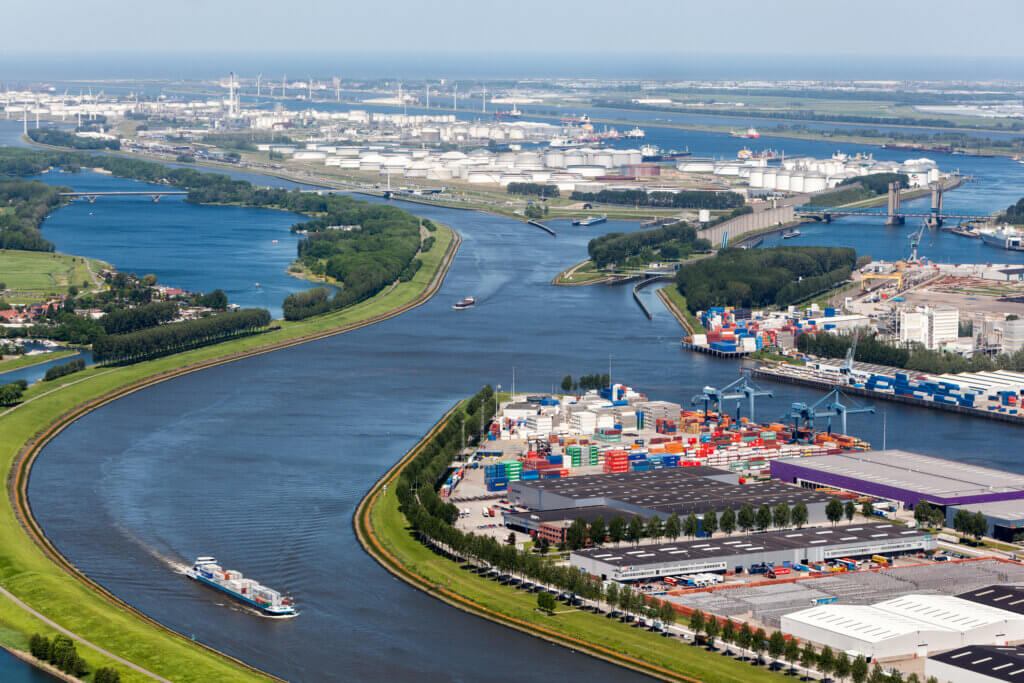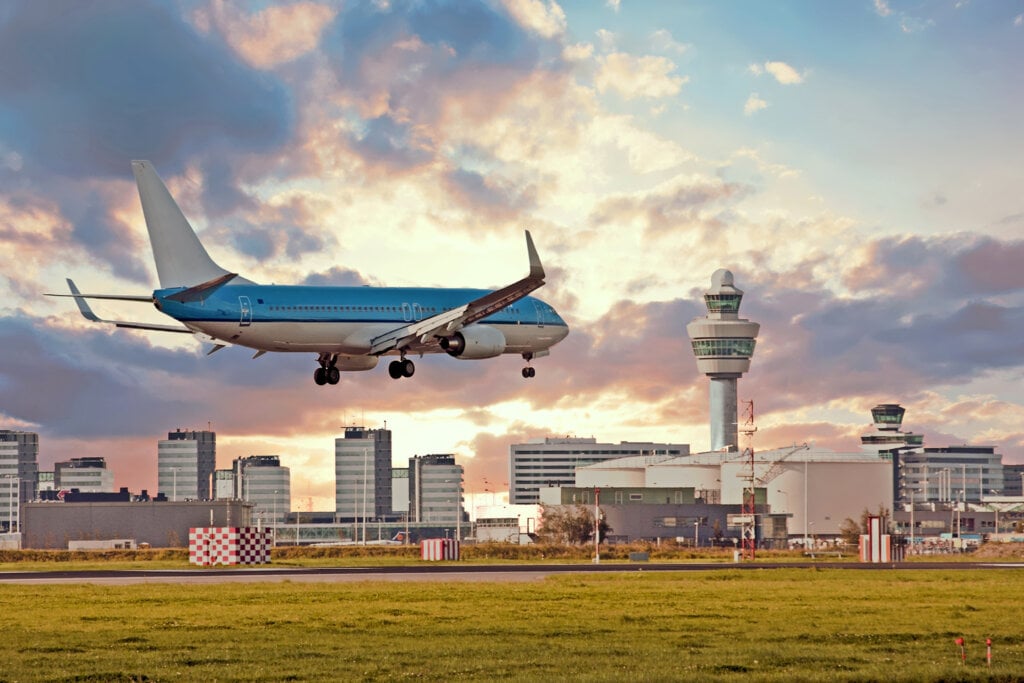What Makes the Netherlands a Global Frontrunner for Sustainable Aviation Fuels
As global demand rises for sustainable solutions in the aviation industry, the Dutch chemical ecosystem is proving it’s up for the challenge
The Netherlands has emerged as a frontrunner in the global push toward sustainable aviation fuel (SAF), being one of three places in the world where large-scale SAF production is taking place. As major airlines and aviation companies around the globe invest heavily in SAF initiatives, the Netherlands is ideally positioned to support the airline industry’s goals to become net zero by 2050.
Why is the Dutch ecosystem so well-equipped to lead the way in SAF? And where are the greatest opportunities for international companies to pioneer SAF in the Netherlands?
The Netherlands’ logistics infrastructure and chemical expertise
Several advantages and characteristics make the Netherlands uniquely suited to advancing SAF. “The Netherlands is one of the major aviation hubs in Europe and a country with a strong focus on sustainability and the green transition. There is also an existing chemical cluster in the Netherlands with deep expertise in biorefining,” shares NFIA Senior Project Manager Chemicals Pieter van Gent. “This explains why the Netherlands is interested in SAF, and how the country has become a frontrunner in the industry.”
Different types of SAF rely on vast amounts of feedstock. For example, HEFA-based SAF draws from vegetable oils, waste oils or fats that must be transported to SAF manufacturing facilities. “The logistics capacities of the Netherlands play a beneficial role in providing an attractive location for producing SAF,” added van Gent. “The Netherlands’ numerous ports offer ideal locations for SAF plants: being in a port means you can have easy access to supplies of feedstock. In addition, the flexibility of feedstock sources at ports decreases risk for chemical companies investing in SAF operations.”
The Netherlands features several seaports that are prime for SAF activity: the Port of Rotterdam, North Sea Port (Zeeland), Port of Moerdijk, Port of Amsterdam and Groningen Seaports. In addition, the Netherlands provides direct access to multiple major airports in Europe through the CEPS pipeline – the safest, cheapest and most sustainable mode of transport for SAF.
Dutch SAF regulation: Going above and beyond for sustainability
The Netherlands is ahead of the curve when it comes to SAF regulation, creating forward-thinking policies that stimulate SAF innovation and adoption across the industry. According to the Dutch Draft Agreement on Sustainable Aviation, the Netherlands aims to make 14 percent of aviation fuel in the country sustainable by 2030, and 100 percent sustainable by 2050. This puts the Netherlands ahead of the already ambitious European Union targets to achieve 6 percent SAF by 2030, and 70 percent by 2050.
With a nationwide ethos of sustainability, it’s no surprise that the Netherlands is a leader in exploring better ways to reduce carbon emissions and promote eco-friendly aviation practices.
Key opportunities for foreign investment in sustainable aviation fuels in the Netherlands
Unlocking supply is a key issue for SAF, not demand. In fact, all current SAF capacity has been sold in long-term contracts. To increase the share of SAF used in commercial aviation, companies will need to focus on diverse business operations – not just production and logistics, but also research & development for innovation, and headquarters for coordinating supply chains, commodity trading and business growth.
Thankfully, the Netherlands provides a robust, synergistic ecosystem to support diverse types of operations along with plentiful opportunities for partnerships. Across the Dutch chemical ecosystem, several companies are already delivering SAF for customers while other projects are being built to become operational within the next several years.
SAF production and storage: Leveraging existing facilities, building future capacity
A strategic benefit of SAF is that companies can repurpose, expand or upgrade their existing bio-refineries to start producing SAF. Other companies may choose to build brand-new facilities for SAF. The Netherlands is ideal for both approaches.
For example, at its Energy and Chemicals Park in Rotterdam, Shell is building a plant where it aims to deliver immense quantities of HEFA-based SAF by 2025. The company signed a long-term agreement with Rotterdam The Hague Airport (RTHA) to supply SAF for all aircraft that refuel at the airport.
Meanwhile, Finland-based Neste is investing to expand capacity at its refinery operations in Rotterdam to produce greater amounts of SAF along with renewable diesel. South African Sasol and Denmark-based Topsoe are teaming up in the Netherlands to bring SAF to market through their joint venture Zaffra.
Swiss energy commodities trader Gunvor has forged a partnership with VARO Energy, in which VARO will build a large-scale SAF manufacturing facility at Gunvor’s site in Rotterdam. Also in Rotterdam, Dutch logistics and energy company Koole Terminals is expanding its distillation capacities to triple SAF production by 2025. Koole Terminals’ facility is also open to toll-distillation, providing opportunities for third parties to start distilling SAF with limited investment costs.
Then there is SkyNRG, one of the best-known Dutch initiatives for SAF. SkyNRG is building Europe’s first fully dedicated SAF production facility in Delfzijl, working with KLM Royal Dutch Airlines, SHV Energy and other partners. And in the Port of Amsterdam, SkyNRG is constructing another facility that will manufacture Synkero, a cutting-edge synthetic kerosene (or eSAF) converted from CO2 and hydrogen, to be supplied to Amsterdam Schiphol Airport via existing pipeline infrastructure.
SAF research & development: Unlocking industry knowledge
From bio-based to synthetic processes, the Netherlands is well-positioned to advance the future of SAF. The country is home to world-renowned knowledge institutions that function as clusters for deep industry knowledge and talent. In fact, Wageningen University & Research pioneered research to create SAFs from novel bio-based feedstocks such as algae, waste wood and tomato stems and waste streams from potato production with its BioJet Fuel project.
Dutch research organization TNO is innovating new processes for electrification of the chemical industry through its VoltaChem program. At its R&D lab and test site in Delft, VoltaChem’s Power-2-Fuels project produces eSAF by combining CO2 and H2O with renewable electricity.
The Netherlands is also at the forefront of SAF processes in earlier stages of development. SkyNRG and LanzaTech are founding members of the FLITE consortium, which is dedicated to engineering groundbreaking commercial solutions for alcohol-to-jet fuels – a form of SAF derived from waste-based ethanol.
Clear skies ahead for sustainable aviation fuels in the Netherlands
Around the world, companies in the chemical sector are just beginning to explore the full possibilities of SAF in its many forms. As a country committed to sustainability and innovation, the Netherlands is a global hub for all types of operations related to producing, moving and advancing SAF.
The Netherlands’ extensive logistics infrastructure enables more efficient operations, while Dutch chemical talent and expertise provide the right “fuel” to create solutions that can contribute toward further commercialization of SAF in the region and globally. If your company wants to elevate aviation to a more sustainable future, you’ll fit right into the Netherlands.
Want to know more about the Netherlands’ sustainable aviation fuel sector? Get in touch with NFIA to start the conversation regarding your international ambitions.
21 May 2024
